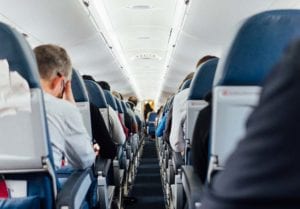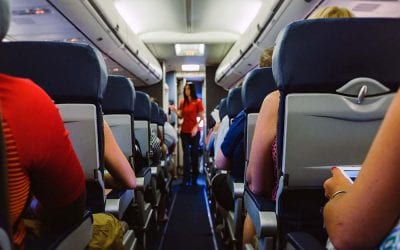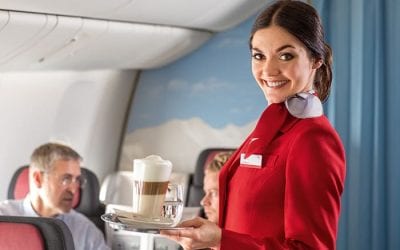 Near monopolies make airlines anathema to good customer service.
Near monopolies make airlines anathema to good customer service.
A story in the April 15, 2017, issue of The Atlantic started with these paragraphs. It dealt with customer service. That’s more than five years ago.
A security guard stops a customer as she tries to enter a well-stocked aisle in a large department store. “Sorry, ma’am,” the guard says. “This sale is for our silver, gold, and platinum shoppers only.” He points her toward the meager discount corner at the back of the store, where bronze-status shoppers are allowed. She passes attendants who smile only at the elite shoppers, offering them refreshments and guiding them toward the best deals. When she stops for gas on the way home, she gets in a long line for the basic pump, while the priority pump sits empty and unused. At the grocery store, she doesn’t have enough points to approach the organic produce.
This beleaguered consumer lives in an alternate reality where businesses can discriminate between their high-value and low-value clientele at will, enticing the biggest spenders to stay while marginalizing bargain hunters and coupon cutters. Most companies couldn’t get away with triaging their customers this way. But some already do: airlines.
The saddest thing about these words is that reality has not changed for customer service on airlines.

Many of these bleisure travelers believe the new, lower service levels are what should be expected. For many new travelers, this is their blowout that they will enjoy no matter what. To new customers, everything is perfect.
For seasoned airline travelers, these perks are not quite up-to-snuff.
The business-class lounges in major hubs are in disrepair, according to long-term frequent fliers. Many business travelers find themselves downgraded as airlines swap planes with more business class seats for others with fewer seats. Many delayed or canceled flights are announced. And the differences between European and US airlines’ compensation are now apparent for delayed and canceled flights.
The differences between passenger compensation are dramatic, especially on US-to-Europe routes on European planes.
If passengers fly on EU planes from the US to Europe, they are entitled to Euros 600 for a three-hour delay if the plane arrives three hours later than planned. All flights from Europe on all airlines covered by the EU regulations to the US are eligible for the Euros 600 compensation.
This legislation helps travelers on flights within the 27 EU nations, specifically: Austria, Belgium, Bulgaria, Croatia, Cyprus, Czech Republic, Denmark, Estonia, Finland, France, Germany, Greece, Hungary, Ireland, Italy, Latvia, Lithuania, Luxembourg, Malta, the Netherlands, Poland, Portugal, Romania, Slovakia, Slovenia, Spain and Sweden.
EU airline regulations cover flights outside of the EU as well, specifically in Guadeloupe, French Guiana, Martinique, Reunion Island, Mayotte, Saint-Martin (French Antilles), the Azores, Madeira, the Canary Islands, Iceland, Norway, and Switzerland. (The Faroe Islands, Isle of Man, and the Channel Islands are omitted.)
Airlines make their schedules. They should follow their own advice and timetables.
In the European Union, airlines are required to follow the schedules they publish. Otherwise, they are fined and have to pay passengers compensation. There is a detailed program of payments that depends on the length of the flight and the distance. It is part of the EU Rule 261.
US airlines have no responsibility to maintain their schedules other than the EU rules for flying return flights from Europe. Congress and the Department of Transportation (DOT) have not made any rules that US airlines must follow their own schedules. The current FAA bill is a perfect time to make a positive move for airline passengers.
Hopefully, some compensation or fines should be imposed other than the refunding of money already collected from passengers. As long as there is no airline skin in the game, they will keep up with the monopolistic practices, the poor maintenance of planes and facilities, and delays and cancelations of flights.
The staff shortage is not helping out the customer service problem.
We’ve recently seen a major aviation industry staffing shortage. At the pandemic’s start, airline customer service employees eligible for retirement or close to retirement were given incentives to retire sooner than later because of the reduced flight schedules and lack of available work. That has caused a domino effect now that travel has rebounded faster than analysts predicted. Currently, the aviation industry lacks full staffing of pilots, flight attendants, and customer service agents, creating delays on the ground, in the air, on the phone, and everywhere.

READ ALSO:
Even smart travelers make these 8 passport mistakes
Use commonsense when crossing international land borders

Charlie Leocha is the President of Travelers United. He has been working in Washington, DC, for the past 14 years with Congress, the Department of Transportation, and industry stakeholders on travel issues. He was the first consumer representative to the Advisory Committee for Aviation Consumer Protections appointed by the Secretary of Transportation from 2012 through 2018.

 Near monopolies make airlines anathema to good customer service.
Near monopolies make airlines anathema to good customer service.

